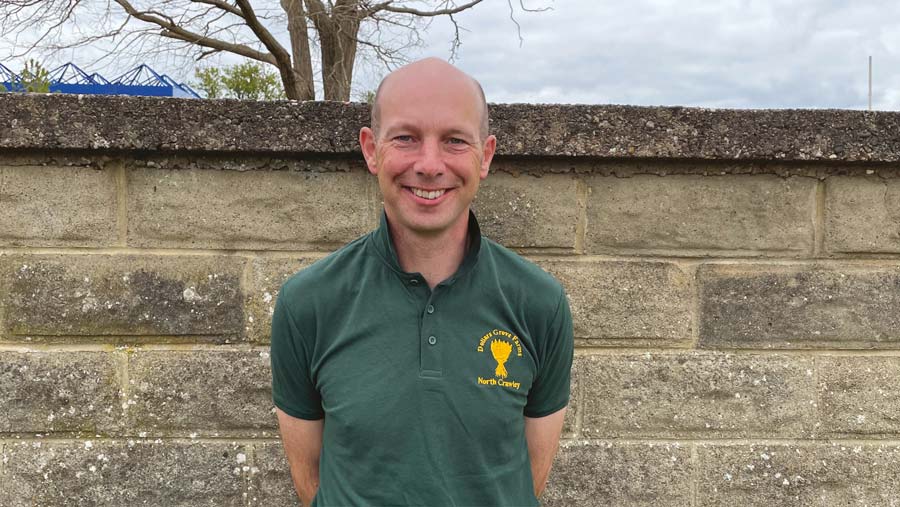How a hybrid regenerative system works on Bucks Monitor Farm
 © AdobeStock/Swetlana Wall
© AdobeStock/Swetlana Wall A hybrid regenerative system has been put in place at Dollars Grove Farm in North Crawley, as the business takes the steps required to secure its sustainable future and build in resilience.
For farm manager Will MacLennan, who hosts the AHDB’s Buckinghamshire and Bedfordshire Monitor Farm, a gradual move to a new farming system based on reduced tillage makes sense, especially as he is keen to maintain yields and minimise exposure to risk.
See also: Regen ag: Why farmers need to give the system time to deliver
Already, there have been both agronomic and financial changes made, as he works with the farm owners to address current industry challenges and meet their business objectives to be a profitable, sustainable and well-presented farming enterprise.
A new business structure means Dollars Grove Farms Ltd is a contracting company, farming across three businesses and one stubble-to-stubble contacting agreement, over a cropped area of 715ha.
The contracting company also has responsibility for the agri-environment schemes and some wider estate duties.

Will MacLennan © AHDB
Current climate
“Like all farmers, we’re very aware of the current difficulties,” says Will.
“As well as the phasing out of BPS, input and running costs are rising at a time of unprecedented commodity price volatility and increased environmental pressure.
“Against this background, decisions about the future have revolved around making major changes, as well as adjustments and improvements to current practice,” he adds.
A more diverse six-year rotation and an extensive soil health plan have already been implemented.
Poor performing areas of the farm have been swapped into environmental options for a more consistent return, while an assessment of suitable grants and agri-environment schemes has been undertaken.
As a result, some 370ha are in the basic SFI soils standard, bringing in a payment of £22/ha, while a Mid-Tier Countryside Stewardship scheme that started in January 2021 includes various options across almost 200ha.
“This Countryside Stewardship agreement is four times the size of the one that preceded it,” says Will.
“It reflects the emphasis that we are putting on natural capital, as we gear up to deliver the public goods expected of us and still produce food.”
Reducing cultivations
While some cultivations will continue as part of a hybrid approach that incorporates regenerative principles, ploughing is now only used as a reset and fixed costs are coming down.
Diesel use has already fallen, from 66 litres/ha (from the start of harvest to the end of autumn cultivations) in 2021 to 44 litres/ha last year – and from a much higher annual use of 101 litres/ha back in 2017.
Having been set the challenge by the owners of having half the farm direct-drilled by 2024, Will and his team have made considerable progress.
Last autumn, in very dry conditions, some 233ha were direct-drilled and 259ha were drilled conventionally, all using the farm’s new Horsch Avatar drill.
Lessons from harvest/autumn 2022 about direct- drilling
- Don’t be scared of direct-drilling in the right circumstances – there was no yield difference seen at Dollars Grove Farm between direct and conventional drilling.
- Preventing moisture loss is critical – especially in a dry year. Late drilled spring barley and spring beans suffered in 2022.
- Timeliness is key – utilising critical drilling windows proved essential for best crops.
- Just because soil is dry doesn’t mean it doesn’t still have structure.
Regenerative principles
Growing winter wheat, winter barley, winter oilseed rape, spring barley and beans, the two-year rotational CS option, AB15, has been strategically placed on marginal land.
With no livestock on the farm, Will is working on bringing four of the five regenerative agriculture principles to the farm, so that soil health is made a priority.
A careful assessment of each field helps to identify those that aren’t ready for direct-drilling and decide on the most appropriate crop establishment method.
The Hanslope series clay soils are prone to surface compaction, so cover crop mixes designed to help with that are used before spring barley.
Earthworm numbers are on the up, helped by the incorporation of chopped straw and use of reduced tillage.
“Like most, we had a surprisingly good cereal harvest in 2022, despite the very dry conditions.
“A comparison of our direct-drilling to the standard cultivated approach showed little difference in net margin and that gave us confidence to make the change to a hybrid system.”
The owners and Will also hope that the new way of farming should build on improvements seen in biodiversity and allow the business to look at ways of monetising carbon and natural capital.
Implementation
Will is also remaining flexible and adapting his plan where necessary, so that it evolves as required. “Recent world events have shown the importance of this – some of our variable costs have increased three-fold.”
Benchmarking has been a focus as the farming system has changed, while goals and Key Performance Indicators have been set.
An outside adviser provides perspective and a good internal meeting structure keeps communication channels open and working well.
“All farms are having to build in some resilience,” says Will. “We’ve decided on the route we need to take and are now busy implementing our plan.”
Monitor Farm role
Will MacLennan’s enthusiasm for being a Monitor Farm host stems from the belief that he will make more progress by being challenged.
During his three-year stint, he is keen to discover different ways of thinking and doing things – which he hopes will come from the two-way sharing of information, ideas and best practice that the meetings encourage.
“We learn as much from failures as we do from successes,” he says. “An open and honest discussion is essential, so it’s good that it’s a farmer-led agenda with no commercial bias.”
A summer meeting and farm walk is planned for Wednesday 21 June 2023, 4-7.30pm. Details are available on the AHDB website.

